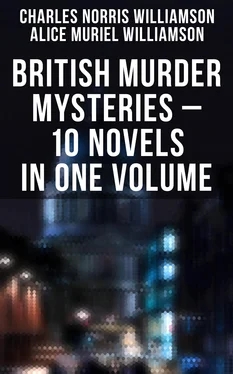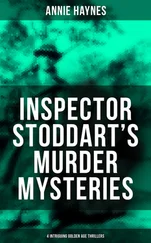She looked down the table, past the other faces to his face, and the thought that came to her mind was, how simple and almost meaningless the rest were compared to his. Among the fourteen guests—seven women and seven men—though some had charm or distinction, his face alone was complex, mysterious, and baffling.
Yet she loved it. Now, more than ever, she loved and admired it!
The dinner ended with a discussion between Knight and Constance as to how the Countess de Santiago could be induced to pay a visit to Valley House, despite the fact that she had never met Lord and Lady Annesley-Seton. Like most women who had lived in Spanish countries, the Countess was rather a "stickler for etiquette," her friend Nelson Smith announced. Besides, her experience as an "amateur clairvoyante" made her quick to resent anything which had the air of patronage. One must go delicately to work to think out a scheme, if Lady Annesley-Seton were really in "dead earnest" about wanting her to come.
At this point Knight reflected for a minute, while everyone hung upon his silence; and at last he had an inspiration:
"I'll tell you what we can do!" he exclaimed. "My wife and I—you're willing, aren't you, Anita?—can ask her to stay over this week-end with us. I think she'll come if she isn't engaged; and we can invite you to meet her at dinner."
"Oh, you must invite us all !" pleaded a pretty woman sitting next to Knight.
"All of you who care to come, certainly," he agreed. "Won't we, Anita?"
"Oh, of course. It will be splendid if everybody will dine with us!" Annesley backed him up with one of the girlish blushes that made her seem so young and ingenuously attractive. "We can—send a telegram to the Countess."
She did her best to speak enthusiastically, and succeeded. No one save Knight and Constance guessed it was an effort.
Knight saw, and was grateful. Constance saw also, and smiled to herself at what she fancied was the girl's jealousy of an old friend of the new husband—an old friend who was "one of the most beautiful women" the girl had seen. Annesley's hesitation inclined Constance to be more interested than ever in the Countess de Santiago.
Table of Contents
Motoring back from Valley House to the Knowle Hotel, Annesley was asking herself whether she might dare refer to the Monarchic , and mention the story she had read In the Morning Post . She burned to do so, yet stopped each time a question pressed to her lips, remembering Knight's eyes as he had looked at the Countess in the Savoy restaurant the day before the wedding.
Perhaps the wish would have conquered if some imp had not whispered, "What about that purple envelope, addressed in a woman's handwriting? Maybe it was from her , hinting to see him again, and that is what has put this plan into his head. Perhaps he brought up the subject of the Countess on purpose to make them invite her here!"
This thought caused the Countess de Santiago to seem a powerful person, with an influence over Knight, though he had appeared not to care for her. Could it be that he wanted an excuse to have her near him? The suggestion closed Annesley's mouth by making her afraid that she was turning into a suspicious creature, like jealous brides she had read about. She determined to be silent as a self-punishment, and firmly steered the Monarchic into a backwater of her thoughts, while Knight talked of the Valley House party and their credulous superstition.
"Every man Jack and every woman Jill of the lot believe in that crystal and clairvoyant nonsense!" he laughed. "I mentioned it for fun, but I went on simply to 'pull their legs.' I hope you don't mind having the Countess down, do you, child? Of course, I made it out to be a favour that so wonderful a being should consent to come at call. But between us, Anita, the poor woman will fall over herself with joy. She's a restless, lonely creature, who has drifted about the world without stopping anywhere long enough to make friends, and I have a notion that her heart's desire is to 'get into society' in England. This will give her a chance, because these good ladies and gentlemen who are dying to see what she's like, and persuade her to tell their pasts and futures, are at the top of the tree. It's a cheap way for us to make her happy—and we can afford it."
"Don't you believe she really is clairvoyant, and sees things in her crystal?" Annesley ventured.
It was then that Knight made her heart beat by answering with a question. "Didn't you read in the newspapers about the queer thing that happened on board the Monarchic ?"
"Ye-es, I did read it," the girl said, in so stifled a voice that the reply became a confession.
"Why didn't you tell me so?"
"Because—the day I heard you were on the Monarchic , I couldn't remember what I'd read. It was vague in my mind——"
"No other reason?"
"Only that—that—I fancied——"
"You fancied I didn't like to talk about the Monarchic ?"
"Well, when the Countess spoke of it, you looked—cross."
"I was cross. But only with the way she spoke—as if she and I had come over together because we were pals. That's all. Though I've every cause to hate the memory of that trip! When did you remember what you had read in the newspapers?"
"Only this evening."
"I thought so! At dinner. I saw a look come over your face."
"I didn't know you noticed me."
"I'm always noticing you. And I was proud of you to-night. Well! You remembered——"
"About a man on board being robbed, and a lady—an 'amateur clairvoyante,' seeing things in a crystal. I thought it must have been the Countess de Santiago."
"It was, though her name was kept out of the papers by her request. She's sensitive about the clairvoyance stuff: afraid people may consider her a professional, and look down on her from patronizing social heights. Of course, I suppose it's nonsense about seeing things in a glass ball, but I believe she does contrive to take it seriously, for she seems in earnest. She did tell people on board ship things about themselves—true things, they said; and they ought to know!
"As for the jewel affair," he added, "nobody could be sure if there was anything in her 'visions', but people thought them extraordinary—even the captain, a hard-headed old chap. You see, a yacht had been sighted the evening before the robbery while the passengers were at dinner. It might have kept near, with lights out, for the Monarchic is one of the huge, slow-going giants, and the yacht might have been a regular little greyhound. It seems she didn't answer signals. The captain hadn't thought much of that, because there was a slight fog and she could have missed them. But it came back to him afterward, and seemed to bear out the Countess's rigmarole.
"Besides, there was the finding of the patent lock, where she told the man Jedfield he ought to look for it."
"I don't remember that in the paper."
"It was in several, if not all. She 'saw' the missing lock—a thing that goes over a bolt and prevents it sliding back—in one of the lifeboats upon the boat-deck, caught in the canvas covering. Well, it was there! And there could be no suspicion of her putting the thing where it was found, so as to make herself seem a true prophetess. She couldn't have got to the place.
" That's why people were so impressed with the rest of the visions. We're all inclined to be superstitious. Even I was interested. Though I don't pin my faith in such things, I asked her to look into the crystal, and see if she could tell what had become of my gold repeater, which disappeared the same night."
"Oh!" exclaimed Annesley. "So you had something stolen?"
Читать дальше












